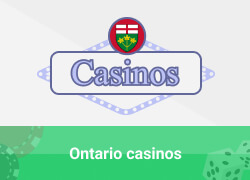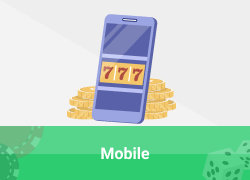



A common question asked by Canadian gamblers is whether they must pay taxes on casino winnings. Luckily, Canadian laws are in their favour, but there are exceptions. Discover when and why gambling winnings are taxed, along with how you can bank your prizes, tax-free.
Gambling-related activity can't be taxed because it’s not a regular source of income and isn’t derived from employment, property or other viable sources. Gambling isn’t considered a business, and most Canadians don’t make a living on their winnings.
According to Paragraph 40(2)(F) of the Income Tax Act, gambling winnings, whether from online or land casinos, sports betting, or horse racing, are tax-free for Canadians, no matter the province.
However, if your gambling winnings result in interest or dividends, from depositing in a savings account or investing in dividend-paying stocks, you're required to pay taxes on this income.
Canadian residents must declare additional earnings made from investing winnings on T3, T5, and T5013 forms. Legally, these contribute to your taxable investment income and get taxed between 15%-33, depending on your income. If your income is less than $50 and you don’t receive a T5 form, it’s essential you still declare it to avoid hefty tax penalties. You should also include these earnings in your personal income tax, but we advise seeking advice at a provincial level because each province has different legislation.
Professional gamblers in poker and sports betting must declare these earnings as taxable income but can deduct losses from the taxable amount. They are subject to both provincial and federal taxes.
No. According to paragraph 40(2)(f) of the Income Tax Act, Canadians do not have to pay taxes on gambling winnings from the likes of horse racing, sports betting, lotteries, online casinos and other games of chance. However, if you earn interest on your winnings, this is taxable, and you must legally declare it via a T5 form. Not declaring this interest could result in severe fines.
Though Canada doesn't directly tax gambling, pros and those profiting from interest on winnings need to account for these in their income tax. This tax isn't one-size-fits-all across Canada; it differs by province. For your convenience, we've compiled a snapshot of potential taxation on gambling interest per province.
Scroll right to view more of table items.
| Province | Tax rate on interest from gambling winnings |
|---|---|
| Ontario | 5.05% - 13.16%, depending on income |
| Quebec | 14% on the initial $49,275 of income |
| British Columbia | 5.06% - 20.50%, with seven brackets |
| Alberta | 10% on the initial $142,292. Across Calgary and other parts of Alberta, up to 15% on income over $341,502 |
| Manitoba | 10.80% - 17.4%, with three tax brackets |
| Saskatchewan | Starts at 10.50% on the first $49,720 of income |
| Nova Scotia | 8.79% - 21%, depending on income |
| New Brunswick | 9.4% - 19.5%, depending on income |
| Prince Edward Island | 9.8% -16.7%, with three tax brackets |
| Newfoundland and Labrador | 8.7% - 21.8%, depending on income |
Withdrawing money from a casino in Canada is a relatively simple process. The specific steps may vary depending on the casino and your chosen method of withdrawal.
First, you'll need to log into your casino account and navigate to the “cashier” or “banking” section. From there, you'll be able to select the “withdraw” option and choose how you'd like to receive your funds.
Common withdrawal methods include:
Some casinos have limits on how much you can withdraw at one time and may require you to verify your identity before processing a withdrawal. Once you've completed the necessary steps, the casino will process your withdrawal request, and the funds should be available in your account within a few days. For additional information on withdrawal processes and the fast-withdrawal operators, check out our updated list of online casinos with fast payout times.
You might have wondered what qualifies you as a professional gambler. Well, if you gamble full-time (online or offline) and make a living from it or are motivated by profit, you're considered a professional and will be required to file taxes. Other factors that indicate you're a professional gambler are:
Professional poker players, blackjack players or any other professional gambler are viewed as operating their own business and this form of income is taxable in Canada. However, this same business can accumulate significant losses which reduce income. Favourably (though we stress the importance of paying due taxes), the Canada Revenue Agency (CRA) is slow to assess and audit people whose source of income comes from gambling. If the CRA started to forcefully tax pro players, there could be a very damaging domino effect throughout the country.
No, you don't have to pay tax on most lottery winnings from the likes of Lotto Max or 649 as these are defined as “windfall” or “luck-based” winnings. This also applies to most winnings sponsored by charitable lotteries or sweepstakes. The CRA does not tax lottery winnings as the “luck” factor indicates that there was no prior expectation of profiting. However, any income generated on your winnings via a non-registered investment or account is subject to taxation. Examples include:
If you ever find yourself in the extremely lucky situation of winning the lottery, you might wonder if any of your winnings will get taxed. Well, guess what? They’re not!
Defined by the Canada Revenue Agency (CRA) as ‘windfalls’ (unexpected payments that also include gifts or inheritances), which are not subject to tax. This is also stated in the often overlooked, yet significant clause in the Income Tax Act., Paragraph 40(2)(f), which explicitly excludes lottery winnings from taxable income.
However, it's important to maintain fiscal vigilance post-win. When your lottery gains enter your financial portfolio, the normal tax obligations come into force. Subsequent interest or capital gains earned from investing your winnings are subject to standard taxation rules. Similarly, if you consider transferring part of your new-found wealth to family or friends, be aware of potential donation tax implications for the recipient.
US citizens must pay almost half of any gambling winnings to the tax man. If you head over to the land of red, white and blue to gamble, you'll have to pay taxes on anything over $1,200 USD. Not declaring it is not an option as when you cash out, 30% is automatically deducted. However, if you're a Canadian citizen legally working in the USA, you can deduct any gambling losses which occurred in the states and receive a relative tax refund.
Though we do have gambling expertise, the Casino.ca team isn't comprised of lawyers. We recommend consulting reputable tax resources or a consultant for further guidance and keeping up to date with ever-changing laws.
As stated at the top of this page, gambling winnings are not taxable in Canada unless the player is deemed professional, or the player is earning income on the winnings. This applies to both [online gambling](/online-gambling/) and offline gambling.
Only players deemed professional gamblers can write off gambling losses and claim business expenses such as travel and entry costs. Recreational players don't get tax deductions on losses.
Writing off your gambling losses in Canada can be extremely difficult, as this is possible only if you are recognised to be a “professional gambler” - and the standard for businesslike behaviour in this context is very high. If you think you may meet the requirements, we advise you to contact a tax lawyer and have a professional guide you through the process.
If a Canadian wins money in Vegas but doesn't live in the US, they can recover taxes on winnings at a tax rate of 30%.
The Criminal Code of Canada lays down the law for perceived [illegal gambling offences](http://criminalnotebook.ca/index.php/Gambling_Offences_(Offence)#:~:text=There%20are%20three%20classes%20of,rules%20or%20regulations%20(204).). The more serious gambling-related offences carry prison terms of around two years, while “lesser” crimes carry prison terms of around six months, along with a $5,000 fine.
It depends. You won't have to pay taxes on gambling winnings, including [high payouts](/highest-payouts/), in Canada unless you're a professional gambler. Read more about how this is defined by scrolling up this page.




Leave the research to our team of experts and enjoy the best selection of online casinos in Canada.
1918 St. Regis Blvd, Montreal, Dorval, QC
H9P 1H6, Canada